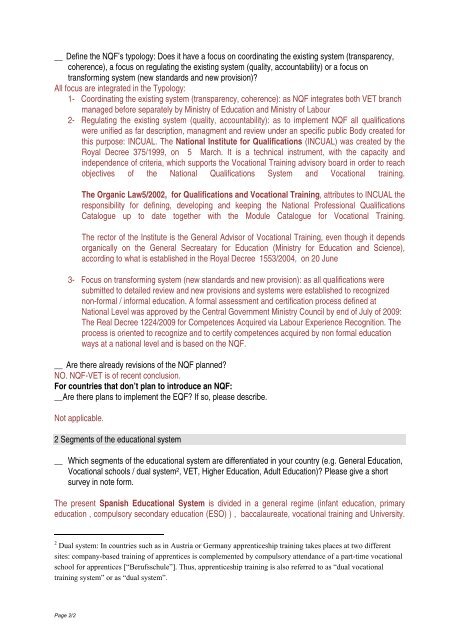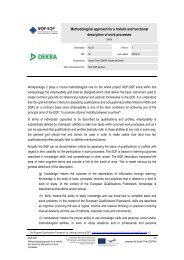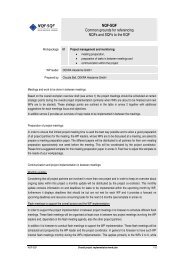Overview of National Qualification frameworks - Project-Nqf-Sqf
Overview of National Qualification frameworks - Project-Nqf-Sqf
Overview of National Qualification frameworks - Project-Nqf-Sqf
You also want an ePaper? Increase the reach of your titles
YUMPU automatically turns print PDFs into web optimized ePapers that Google loves.
__ Define the NQF’s typology: Does it have a focus on coordinating the existing system (transparency,coherence), a focus on regulating the existing system (quality, accountability) or a focus ontransforming system (new standards and new provision)?All focus are integrated in the Typology:1- Coordinating the existing system (transparency, coherence): as NQF integrates both VET branchmanaged before separately by Ministry <strong>of</strong> Education and Ministry <strong>of</strong> Labour2- Regulating the existing system (quality, accountability): as to implement NQF all qualificationswere unified as far description, managment and review under an specific public Body created forthis purpose: INCUAL. The <strong>National</strong> Institute for <strong>Qualification</strong>s (INCUAL) was created by theRoyal Decree 375/1999, on 5 March. It is a technical instrument, with the capacity andindependence <strong>of</strong> criteria, which supports the Vocational Training advisory board in order to reachobjectives <strong>of</strong> the <strong>National</strong> <strong>Qualification</strong>s System and Vocational training.The Organic Law5/2002, for <strong>Qualification</strong>s and Vocational Training, attributes to INCUAL theresponsibility for defining, developing and keeping the <strong>National</strong> Pr<strong>of</strong>essional <strong>Qualification</strong>sCatalogue up to date together with the Module Catalogue for Vocational Training.The rector <strong>of</strong> the Institute is the General Advisor <strong>of</strong> Vocational Training, even though it dependsorganically on the General Secreatary for Education (Ministry for Education and Science),according to what is established in the Royal Decree 1553/2004, on 20 June3- Focus on transforming system (new standards and new provision): as all qualifications weresubmitted to detailed review and new provisions and systems were established to recognizednon-formal / informal education. A formal assessment and certification process defined at<strong>National</strong> Level was approved by the Central Government Ministry Council by end <strong>of</strong> July <strong>of</strong> 2009:The Real Decree 1224/2009 for Competences Acquired via Labour Experience Recognition. Theprocess is oriented to recognize and to certify competences acquired by non formal educationways at a national level and is based on the NQF.__ Are there already revisions <strong>of</strong> the NQF planned?NO. NQF-VET is <strong>of</strong> recent conclusion.For countries that don’t plan to introduce an NQF:__Are there plans to implement the EQF? If so, please describe.Not applicable.2 Segments <strong>of</strong> the educational system__ Which segments <strong>of</strong> the educational system are differentiated in your country (e.g. General Education,Vocational schools / dual system 2 , VET, Higher Education, Adult Education)? Please give a shortsurvey in note form.The present Spanish Educational System is divided in a general regime (infant education, primaryeducation , compulsory secondary education (ESO) ) , baccalaureate, vocational training and University.2 Dual system: In countries such as in Austria or Germany apprenticeship training takes places at two differentsites: company-based training <strong>of</strong> apprentices is complemented by compulsory attendance <strong>of</strong> a part-time vocationalschool for apprentices [“Berufsschule”]. Thus, apprenticeship training is also referred to as “dual vocationaltraining system” or as “dual system”.Page 2/2




